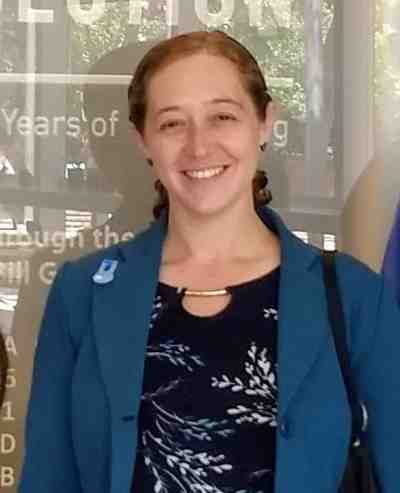Kate Tasker

How did you become interested in librarianship?
As I was earning my BA in history I was looking for a career that would involve research and information discovery, but at the time I wasn’t particularly drawn to teaching. I saw “archivist” in a list of careers for history majors, and that immediately appealed to me. Much later I was sorting through some old personal papers (archivists do that for fun) and I found some forgotten writing from when I was seven years old, which imagined myself as a librarian when I grew up. Like many library staff I have a lifelong love of books and learning, so I think it’s always been a calling!
Describe the first time you worked in a library.
I started out working at the San Francisco branch of the National Archives and Records Administration (NARA), as a student archives technician. I had great colleagues and did a range of tasks, from photocopying and scanning documents for patrons, to archival processing, to providing reference services to historians and genealogists. My favorite part of the job was helping people track down stories of their families in census and immigration records.
I’m serving currently as Chair of the LAUC-SF division.
What do you like best about being a UC librarian?
I enjoy being part of such a diverse network of people of all interests and backgrounds, and getting to collaborate with and learn from amazing colleagues.
Describe a recent or current project on which you are working.
With the team at the UCSF Industry Documents Library, I’m developing workflows for a crowdsourcing project to enable citizen archivists to help describe our digitized documents. Our collections of industry documents come from litigation, public records requests, and sometimes from other library and archive collections, and they help researchers investigate and understand the influence of various industries on science and public health policy. The Industry Documents Library began as the online Legacy Tobacco Documents Library in 2002, with over 40 million pages of files obtained during litigation against the major tobacco companies. Over the past 18 years it has expanded to include documents from the drug, chemical, food, and fossil fuel industries and we now have more than 92 million pages – so that’s a lot of documents to describe!
Describe your recent professional work outside of work, such as association work, writing, research, or anything else.
I’ve served in various roles with the Society of California Archivists (SCA) ever since I started volunteering with their membership committee when I was still in library school, on the advice of my supervisor at the time. It was fantastic advice because SCA is a marvelous and supportive professional organization, and I have had the opportunity to get to know many kind and interesting archivists and librarians in California while developing valuable leadership skills at the same time. Most recently I was co-chair of the Local Arrangements Committee helping to organize the Western Archivists Meeting in San Francisco, which unfortunately had to be cancelled due to the coronavirus outbreak.
What would you like the next big thing in libraries to be?
Complete this statement: "One surprising fact about me is...”
I love puns – the more groan-inducing, the better!
Can you recommend a book or movie or tell us your favorite book or movie and why?
I recently read Lands of Lost Borders by Kate Harris, which is a spellbinding and utterly transportive account of her journey by bicycle along the Silk Road, from Turkey to India. In addition to being a gripping travel adventure, it is also a deeply thoughtful book about examining the borders and boundaries of landscapes and of human nature, in the context of history, science, and exploration.
